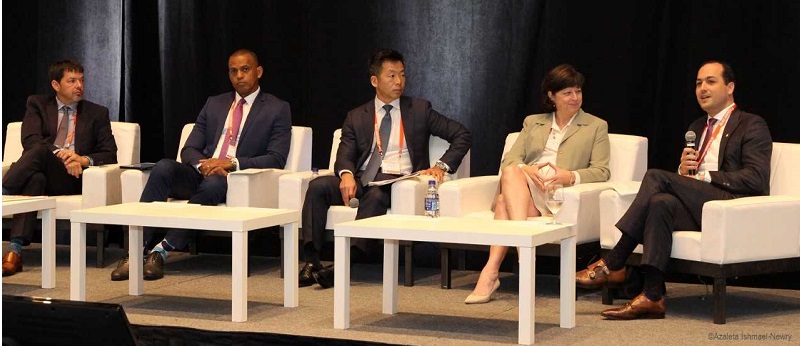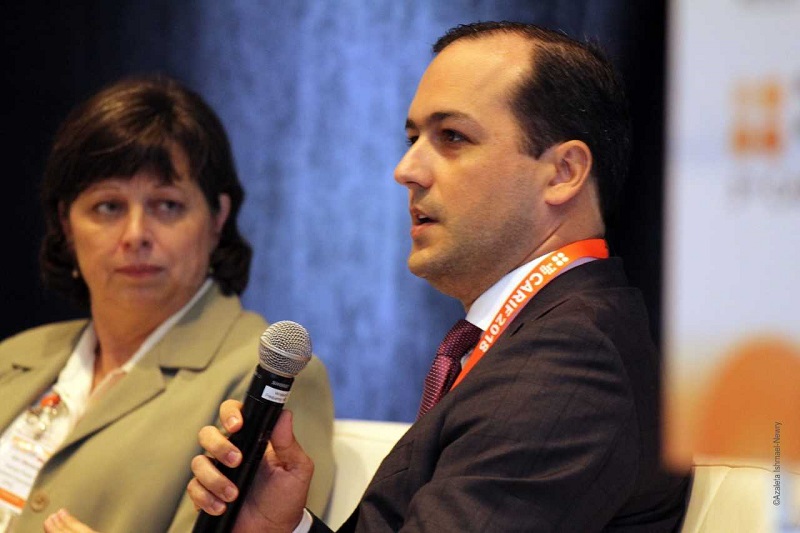Financial institution discusses trends related to monetary and climate resilient infrastructure.
NASSAU, Bahamas - CIBC FirstCaribbean headed two key sessions at this year’s Caribbean Infrastructure Forum (CARIF 2018), targeting trends in financing Caribbean infrastructure and climate resilient water infrastructure.
The conference, which explores the financing and construction of world class infrastructure projects throughout the Caribbean, took place at the Baha Mar Convention center on December 4th and 5th, 2018.
Managing Director and Head of Investment Banking at CIBC FirstCaribbean International Bank, Adam Carter, said having more resilient infrastructure projects goes a long way in improving the lives of citizens and increasing economic prosperity through increased job creation.
 “CIBC and CIBC FirstCaribbean are very strong and very committed players in the infrastructure space across the globe and closer to home. We have been at the forefront of many projects from government initiatives to government sponsored deals to private sector deals. I think we have helped improve the competitiveness of the process and we certainly try to be innovative in terms of providing world standard products and advisory services to get projects off the ground. We stand ready to continue that push in the islands that we have our footprint in,” Carter said.
“CIBC and CIBC FirstCaribbean are very strong and very committed players in the infrastructure space across the globe and closer to home. We have been at the forefront of many projects from government initiatives to government sponsored deals to private sector deals. I think we have helped improve the competitiveness of the process and we certainly try to be innovative in terms of providing world standard products and advisory services to get projects off the ground. We stand ready to continue that push in the islands that we have our footprint in,” Carter said.
Executive Director of Corporate Finance and Advisory, CIBC FirstCaribbean Corporate Investment Banking, Gillian Charles-Gollop, moderated the session dedicated to financing climate resilient water infrastructure. She emphasized the significant need for stakeholders and authorities to consider ways of reducing the impact of extreme weather events on water supply.
“In the last year we have had several islands that were hit hard in the region with significant destruction of infrastructure. The resulting damage and disruption to water services severely impacted not only the general population, but also the supply of other essential services that would have an impact on both health and other environmental risks,” said Mrs. Charles-Gollop.
She said across the region, the issue of water security and infrastructural resilience is a key agenda for many countries, with several multilateral agencies supporting the development of sustainable water infrastructure.
“In many of our own islands, an added challenge is that water treatment infrastructure remains outdated, inefficiently managed and heavily subsidized indicating the critical need for national water processes and planning for a sustainable future. Given also that our countries also face a very high debt to GDP load, alternative financing and operating structures is a prudent consideration,” said Gollop.
The Caribbean Infrastructure Forum (CARIF) is the largest gathering of regional infrastructure market on the annual calendar. CARIF 2018 convened policy-makers, utilities, multilaterals and financiers to map out the region’s infrastructure need, generate vital new relationships, and introduce world-class Caribbean projects to international sources of financing.







